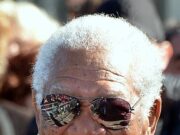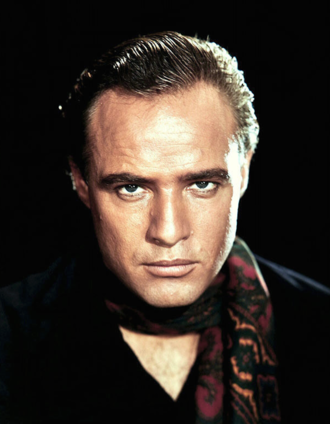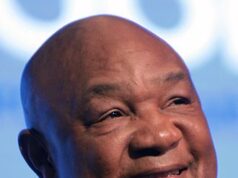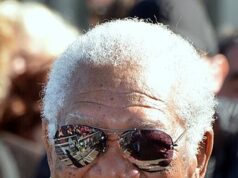Marlon Brando was an American actor and activist who was considered one of the greatest actors of the 20th century. He was known for his method acting and his iconic roles in films such as A Streetcar Named Desire, On the Waterfront, The Godfather, and Apocalypse Now. He was also a cultural icon of rebellion and youth, and an activist for various causes such as civil rights, Native American rights, and animal rights. He had a turbulent personal life that involved many relationships, children, tragedies, and health problems. He died in 2004 at the age of 80.
Here are some controversial quotes from Marlon Brando
“The only reason I’m in Hollywood is that I don’t have the moral courage to refuse the money.” This quote reveals Brando’s cynical and ambivalent attitude towards his film career and the Hollywood industry. He often expressed his disdain for the commercialism and superficiality of Hollywood, and his preference for the artistic integrity and challenge of theater. He also admitted that he took many roles for financial reasons, rather than artistic ones, especially in his later years when he faced personal and legal troubles. He once said that he was “more interested in the nature of my bank account than in the nature of my work”.
- “Privacy is not something that I’m merely entitled to, it’s an absolute prerequisite.” This quote reflects Brando’s desire for privacy and his aversion to publicity. He was notoriously reclusive and avoided interviews, autographs, and fan interactions. He also disliked being photographed and often wore disguises or hid his face from the cameras. He believed that his personal life was none of the public’s business, and that fame had a negative impact on his relationships and his mental health. He once said that fame “will destroy you if you let it”.
- “If we are not our brother’s keeper, at least let us not be his executioner.” This quote shows Brando’s humanitarian and pacifist views. He was an activist for various causes, such as civil rights, Native American rights, anti-war movements, and animal rights. He also opposed violence and oppression in any form, and spoke out against injustice and inequality. He used this quote in his speech written for the Academy Awards in 1973, when he refused to accept his Oscar for The Godfather in protest of Hollywood’s treatment of Native Americans. He sent an actress named Sacheen Littlefeather to decline the award on his behalf and to read his speech, which denounced the stereotypical and degrading portrayal of Native Americans in films.
- “I don’t mind that I’m fat. You still get the same money.” This quote demonstrates Brando’s indifference to his physical appearance and his weight gain later in life. He struggled with obesity, diabetes, and lung failure, which affected his health and his career. He became less attractive and less employable as a leading man, and often had to wear prosthetics or makeup to alter his appearance. He also had to deal with mockery and criticism from the media and the public. However, he claimed that he did not care about his looks or what others thought of him, as long as he got paid for his work.
- “With women, I’ve got a long bamboo pole with a leather loop on the end. I slip the loop around their necks so they can’t get away or come too close. Like catching snakes.” This quote illustrates Brando’s controversial and complicated relationship with women. He had many romantic relationships with both men and women throughout his life, but he was never faithful or committed to any of them. He was married three times and fathered 11 children from different partners, but he also had affairs with many celebrities, such as Marilyn Monroe, Rita Moreno, Grace Kelly, Audrey Hepburn, and Richard Pryor. He was accused of being a womanizer, a misogynist, a narcissist, and a sex addict by some of his lovers and critics. He also had a reputation for being abusive, manipulative, and cruel towards some of his partners.
- “Acting is the expression of a neurotic impulse. It’s a bum’s life. Quitting acting, that’s the sign of maturity.” This quote reveals Brando’s conflicted and negative feelings about acting and his profession. He often expressed his dissatisfaction and boredom with acting, and said that he did not enjoy or respect his work. He also said that he felt that acting was a childish and escapist activity, and that he wanted to quit and do something more meaningful and productive with his life. He once said that he wished he had become a novelist, a painter, or a musician, instead of an actor.
- “The more sensitive you are, the more certain you are to be brutalized, develop scabs, never evolve. Never allow yourself to feel anything, because you always feel too much.” This quote reflects Brando’s emotional and psychological struggles. He was known to be a sensitive and vulnerable person, who suffered from depression, anxiety, and low self-esteem. He also experienced many traumas and tragedies in his life, such as abuse, neglect, rejection, betrayal, violence, death, and guilt. He tried to cope with his pain by numbing himself with drugs, alcohol, food, sex, and isolation. He once said that he felt like “a man who has been condemned to death”.
- “I have eyes like those of a dead pig.” This quote shows Brando’s self-deprecating humor and his lack of vanity. He was famous for his good looks and his sex appeal in his younger years, but he did not seem to care much about his appearance or his image. He often made fun of himself and his flaws, such as his small eyes, which he compared to those of a dead pig. He also said that he hated looking at himself in the mirror or on screen.
- “The only thing an actor owes his public is not to bore them.” This quote indicates Brando’s artistic philosophy and his attitude towards his audience. He believed that an actor’s main responsibility was to entertain and captivate the viewers with their performance, rather than to please them or conform to their expectations. He also believed that an actor should be honest and authentic in their portrayal of their characters, rather than to follow conventions or clichés. He often experimented with different styles and techniques of acting, such as improvisation, mumbling, whispering, gesturing, or using props.
- “People will like you who never met you, they think you’re absolutely wonderful; and then people also will hate you, for reasons that have nothing to do with any real experience with you. People don’t want to lose their enemies. We have favorite enemies, people we love to hate and we hate to love. If they do something good, we don’t like it. I found myself doing that with Ronald Reagan. He is anathema to me. If he does something that’s reasonable, I find my mind trying to find some way to interpret it so that it’s not reasonable, so that somewhere it’s jingoist extremism.” This quote exposes Brando’s insight into human nature and politics. He observed how people tend to form opinions about others based on their prejudices or biases, rather than on facts or evidence. He also noticed how people tend to cling to their enemies or their hatreds, rather than to seek understanding or reconciliation. He admitted that he was guilty of this himself when it came to Ronald Reagan, whom he despised for being a conservative politician and a former actor.
Here are some interesting facts about Marlon Brando
- He was born in Omaha, Nebraska. Marlon Brando Jr. was born on April 3, 1924, in Omaha, Nebraska, to Marlon Brando Sr., a calcium carbonate salesman, and Dorothy Julia Pennebaker, an artistically inclined housewife. He was the youngest of three children and had two sisters, Jocelyn and Frances. He grew up in a troubled family, as his father was an alcoholic and his mother was often absent due to her involvement in local theater. Brando later said that he was deeply influenced by his mother’s love of acting and her encouragement of his artistic talents.
- He was expelled from several schools. Brando had a rebellious and restless nature as a child and a teenager. He was frequently in trouble for his poor grades, bad behavior, and pranks. He attended several schools, including Shattuck Military Academy in Minnesota, where his father had studied, but he was expelled from most of them for various reasons. He finally dropped out of high school at the age of 16 and moved to New York City to pursue an acting career.
- He studied with Stella Adler and became a method actor. In New York, Brando enrolled in the Dramatic Workshop of The New School, where he met the legendary acting teacher Stella Adler, who introduced him to the Stanislavski system of acting and the technique of method acting. Brando became one of Adler’s most devoted and talented students, absorbing her teachings on how to create realistic and emotional characters by drawing on one’s own experiences and memories. He also studied with other influential teachers, such as Lee Strasberg and Elia Kazan.
- He made his Broadway debut in A Streetcar Named Desire. Brando’s breakthrough role came in 1947, when he was cast as Stanley Kowalski in Tennessee Williams’ play A Streetcar Named Desire, directed by Elia Kazan. His raw and powerful performance as the brutish and sensual Stanley stunned the audiences and critics alike, and established him as a rising star of the American theater. He reprised the role in the 1951 film adaptation, which earned him his first Academy Award nomination for Best Actor.
- He won two Oscars for On the Waterfront and The Godfather. Brando’s film career spanned six decades and included many memorable roles that showcased his versatility and charisma. He won his first Oscar for Best Actor for his portrayal of Terry Malloy, a former boxer turned dockworker who stands up against corruption, in On the Waterfront (1954), directed by Elia Kazan. He won his second Oscar for Best Actor for his iconic role as Vito Corleone, the aging patriarch of a powerful mafia family, in The Godfather (1972), directed by Francis Ford Coppola. However, he refused to accept the award in protest of Hollywood’s treatment of Native Americans and sent an actress named Sacheen Littlefeather to decline it on his behalf.
- He was a cultural icon of rebellion and youth. Brando’s image as a rebel and a nonconformist resonated with the younger generation of the 1950s and 1960s. He became a symbol of counterculture and social change with his roles as Johnny Strabler, the leader of a motorcycle gang in The Wild One (1953), Emiliano Zapata, the Mexican revolutionary leader in Viva Zapata! (1952), and Paul, a widowed American expatriate who engages in a torrid affair with a young French woman in Last Tango in Paris (1972). He also influenced many actors who admired his style and attitude, such as James Dean, Robert De Niro, Al Pacino, Jack Nicholson, and Johnny Depp.
- He was an activist for various causes. Brando was not only an actor but also an activist who used his fame and fortune to support various causes that he believed in. He was an outspoken critic of racism, colonialism, imperialism, and war. He supported the civil rights movement, the American Indian Movement, the Black Panther Party, and the anti-Vietnam War movement. He also advocated for animal rights, environmentalism, and humanitarianism. He donated money to various charities and organizations, such as UNICEF, Greenpeace, Amnesty International, and Doctors Without Borders.
- He had 11 children from different relationships. Brando had a complicated and turbulent personal life that involved many romantic relationships with both men and women. He was married three times: to Anna Kashfi (1957-1959), Movita Castaneda (1960-1968), and Tarita Teriipaia (1962-1972). He also had affairs with many celebrities, such as Marilyn Monroe, Rita Moreno, Grace Kelly, Audrey Hepburn, and Richard Pryor. He fathered 11 children from different partners: Christian (with Kashfi), Miko (with Castaneda), Rebecca (with Paula Mitchell), Simon (with Teriipaia), Cheyenne (with Teriipaia), Ninna (with Christina Ruiz), Myles (with Tarita Cheyenne Brando), Timothy (with an unknown woman), Maimiti (with Teriipaia), Raiatua (with Teriipaia), and Angelique (with Donna Lopez Geon). He also adopted two children: Petra Brando-Corval (the daughter of his assistant Caroline Barrett) and John Brando (the son of his housekeeper Maria Cristina Ruiz).
- He suffered from personal tragedies and health problems later in life. Brando faced many difficulties and tragedies in his later years that affected his mental and physical health. His son Christian was convicted of manslaughter for killing Dag Drollet, the boyfriend of his daughter Cheyenne, in 1990. His daughter Cheyenne committed suicide by hanging herself in 1995 after suffering from depression and drug addiction. His son Miko became paralyzed from the waist down after a motorcycle accident in 1999. Brando himself struggled with obesity, diabetes, and lung failure. He became reclusive and rarely appeared in public or in films. He died on July 1, 2004, at the age of 80, from respiratory failure and congestive heart failure.
- He is widely regarded as one of the greatest actors of all time. Despite his personal problems and professional decline, Brando remains one of the most respected and influential actors of all time. He is ranked by various critics and publications as one of the greatest actors in film history, alongside Laurence Olivier, Charlie Chaplin, Orson Welles, and Robert De Niro. He has received numerous awards and honors for his work, including two Oscars, two Golden Globes, one Cannes Film Festival Award, three BAFTA Awards, one Screen Actors Guild Award, one Kennedy Center Honor, and one AFI Life Achievement Award. He has also been immortalized in various forms of media and culture, such as books, documentaries, songs, statues, stamps, and video games.


































